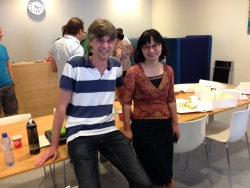
2 x VIDI grants for research group

Understanding the causal relationships between the host genome, microbiota and lipids - Dr. Jingyuan Fu
Lipid composition varies widely between human individuals and is associated with many diseases. Numerous studies have shown that the lipid composition can be affected by an individual’s genetic make-up and intestinal microbial composition. Over millions of years, microbes and humans have formed a truly symbiotic relationship. It has been hypothesized that the host’s genetic make-up can lead to a specific microbial composition that could predispose to individual variation in lipid composition. Despite several appealing studies in rodents, this hypothesis has not yet been systematically tested in humans.
I propose to test this hypothesis by simultaneously screening the impact of the host’s genetic make-up on gut microbiota and lipids in 1,500 individuals and using mathematical models to understand their causal relationships. I have four specific objectives: to perform (1) a lipidomics analysis to characterize lipid composition in plasma and faecal samples; (2) a metagenomewide analysis to identify microbial species involved in lipid composition; (3) a genome-wide analysis to identify genetic variants associated with the compositions of lipids and microbes; and (4) an analysis to reveal the genome-microbe causality in relation to lipids. This research will identify the genetic variants that affect the lipid composition by mediating a specific microbial composition. This insight will deepen our understanding of the human-microbe symbiosis at various genetic levels. A better understanding of the causal relationships between the host genome, microbiota and lipids will be a prerequisite for paving the way for personalized medicine and for providing a rationale for novel therapeutic intervention targeting microbiota.
This project will also deliver another important benefit in the form of a bioinformatics analysis pipeline for the simultaneous analysis of the genome, the microbiome and metabolism. This will have wide application in plant and animal, as well as human biological studies.
A novel approach to understanding how DNA variants cause disease - Dr. Lude Franke
Since 2005, genome-wide association studies (GWAS) have identified over 10,000 genetic risk variants (SNPs), associated to hundreds of diseases. Many of the risk-SNPs point to genes and pathways not previously known to play a role in the disease of interest. This is both an advantage – as it generates new hypotheses – but also a disadvantage, since the majority of risk-SNPs have small effect sizes, making it challenging to devise experiments aimed at elucidating the disease mechanisms.
I hypothesize that, for most diseases, the individual risk SNPs converge on a limited number of downstream genes and pathways that confer the susceptibility to disease . Identification of these key genes and disease pathways provides an excellent starting point for understanding the general and disease-specific mechanisms involved in individual diseases and groups of diseases. The aim of my proposal is to: (1) develop and apply novel statistical methods to functional genomics datasets to identify the downstream genes and pathways that are affected by risk-SNPs, (2) identify the tissues/cells that show these molecular effects, and (3) identify the key genes and key pathways on which the majority of risk-SNPs converge.
This project is given direction by two developments by my research group: (1) the collection and integration of large ‘omics’ datasets that are now (publicly) available, and (2) the experience that I have built up in developing statistical frameworks for identifying the downstream consequences of risk-SNPs using such datasets. I will obtain proof-of-concept by applying my methods to autoimmune diseases (one of my department’s major research lines). With my research I will be able to reveal previously unknown cell-types and genes involved in disease, as a first step towards elucidating disease mechanisms. The key genes identified may provide leads for pharmaceutical intervention.
| Last modified: | 18 December 2023 08.29 a.m. |
More news
-
18 April 2024
PET-scan expert Jan Pruim benoemd tot Officier in Orde van Oranje Nassau
Hoogleraar medische beeldvorming Jan Pruim is bij zijn afscheid van het UMCG benoemd tot Officier in de Orde van Oranje Nassau. De koninklijke versierselen werden hem op woensdag 17 april uitgereikt door burgemeester Koen Schuiling van de gemeente...
-
16 April 2024
UG signs Barcelona Declaration on Open Research Information
In a significant stride toward advancing responsible research assessment and open science, the University of Groningen has officially signed the Barcelona Declaration on Open Research Information.
-
02 April 2024
Flying on wood dust
Every two weeks, UG Makers puts the spotlight on a researcher who has created something tangible, ranging from homemade measuring equipment for academic research to small or larger products that can change our daily lives. That is how UG...
